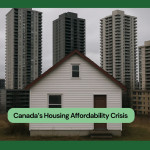Canada has long been a popular destination for international students due to its high-quality education system, vibrant multicultural cities, and excellent living standards. Many international students, after arriving in Canada, may consider buying property, either as an investment or as a way to secure stable accommodation while studying. But the question arises: Can an international student buy a house in Canada?
The short answer is yes, international students can buy property in Canada, but there are a few important factors to consider, including legal requirements, financing options, and potential tax implications.
Let’s explore what international students need to know about purchasing real estate in Canada.
Thing to learn for International student in Canada for House buying
1. Is It Legal for International Students to Buy a House?
Yes, international students can legally purchase property in Canada. There are no specific residency or citizenship requirements that restrict non-Canadians from buying real estate. This includes single-family homes, condominiums, and even investment properties. However, starting in 2023, Canada implemented a two-year ban on foreign homebuyers purchasing residential property under the Prohibition on the Purchase of Residential Property by Non-Canadians Act.
Important Exception for Students: Fortunately, international students are exempt from this ban if they meet certain conditions:
- They have lived in Canada for a minimum of 244 days in each of the past five years before purchasing the property.
- The property's price does not exceed $500,000 CAD.
- The student is enrolled in a full-time program at a recognized Canadian institution.
- They have not previously purchased residential property in Canada.
This exemption allows international students to continue buying homes if they qualify under these specific criteria.
2. Financing the Purchase
Purchasing a home can be a significant financial investment, and international students may need to explore financing options if they don’t have the full amount to pay upfront. Here’s how financing typically works for international students:
Down Payment Requirements: International students are generally required to make a larger down payment than Canadian citizens or permanent residents. The typical down payment is at least 35% of the purchase price. This is because Canadian banks consider non-residents a higher risk for mortgage loans.
Mortgage Approval: Obtaining a mortgage can be challenging for international students due to their lack of Canadian credit history. However, it is not impossible. Some Canadian banks offer mortgage options to non-residents, provided they meet specific requirements such as having a steady income source or a guarantor with a strong credit history in Canada.
Proof of Income: Most lenders will ask for proof of income or financial support. For students, this could mean showing proof of scholarships, stipends, family financial support, or income from a part-time job or internship.
3. Tax Implications
Owning property in Canada comes with certain tax responsibilities, even for international students. Some important tax considerations include:
Property Taxes: As a homeowner in Canada, you'll be responsible for paying property taxes, which vary depending on the city and province in which you purchase. These taxes are paid annually and are typically based on the value of your property.
Foreign Buyers Tax: In some parts of Canada, such as British Columbia and Ontario, there is an additional tax known as the Foreign Buyers Tax, which is an extra 20% on top of the property's purchase price. However, international students who qualify under certain conditions (such as being enrolled in a recognized Canadian school) can sometimes get an exemption from this tax.
Income Taxes on Rental Properties: If you plan to rent out your property while you’re still a student, any rental income earned will be subject to Canadian taxes, and you'll need to file a tax return for that income.
4. Additional Costs to Consider
When buying a home, there are several additional costs that international students should be prepared for:
Closing Costs: In addition to the down payment, buyers typically pay 1.5% to 4% of the home's purchase price in closing costs. These can include legal fees, land transfer taxes, and title insurance.
Maintenance and Utility Costs: Homeownership also means taking on the responsibility of maintaining the property and paying for utilities like electricity, water, and internet.
Insurance: You’ll need to purchase home insurance to protect your property and its contents. Some lenders may require proof of insurance before finalizing a mortgage.
5. Benefits of Owning a Home as an International Student
There are several potential benefits to buying a home while studying in Canada:
Long-Term Investment: Real estate in major Canadian cities like Toronto, Vancouver, and Montreal has historically appreciated over time. This makes buying a home a potential long-term investment, especially if you plan to stay in Canada after graduation.
Stable Living Arrangements: By owning a home, you avoid the stress of finding new rental accommodations each year, which can often be more expensive, especially in student-heavy areas.
Post-Graduation Plans: If you plan to apply for permanent residency (PR) in Canada after your studies, having already purchased a home can give you a sense of stability and may strengthen your application.
6. Challenges of Homeownership for Students
While there are many potential benefits to buying a home, there are also challenges to consider:
Financial Responsibility: Homeownership can be financially demanding, especially for students who may not have a steady source of income.
Potential for Market Fluctuations: The real estate market can fluctuate, and there’s always a risk that property values may decrease, affecting your investment.
Time Commitment: Managing a property, especially if you plan to rent it out, can take time and energy away from your studies.
Conclusion
Yes, an international student can buy a house in Canada, but it comes with important financial, legal, and tax responsibilities. If you meet the criteria for the foreign buyer exemption, have a solid financial plan, and are prepared for the challenges of homeownership, buying property could be a great opportunity. Always consult a real estate expert or financial advisor to help guide you through the process and ensure you're making the best decision for your situation.
For more information and guidance on buying property in Canada as an international student, visit thehomess.com. We regularly provide updates and tips to help you navigate the real estate market.
Related posts:
Discover affordable ways to create a cozy Canadian home this winter. Budget décor, lighting, and DIY ideas to keep your space warm and stylish all season.
Discover the top 5 real estate investment trends in Canada for 2025. Learn where smart investors are finding growth, profit, and long-term value.


 How to Make Your Canadian Home Cozy on a Budget: Winter-Proof Décor Tips
How to Make Your Canadian Home Cozy on a Budget: Winter-Proof Décor Tips  5 Real Estate Investment Trends Every Canadian Investor Should Know in 2025
5 Real Estate Investment Trends Every Canadian Investor Should Know in 2025  Why Canada’s Housing Affordability Crisis Isn’t Over Yet
Why Canada’s Housing Affordability Crisis Isn’t Over Yet  Cost of Living in Edmonton (2025) - Rent, Homes & Daily Expenses
Cost of Living in Edmonton (2025) - Rent, Homes & Daily Expenses  CMHC Mortgage Loan Insurance Update 2025 | MLI Select Premium Changes
CMHC Mortgage Loan Insurance Update 2025 | MLI Select Premium Changes